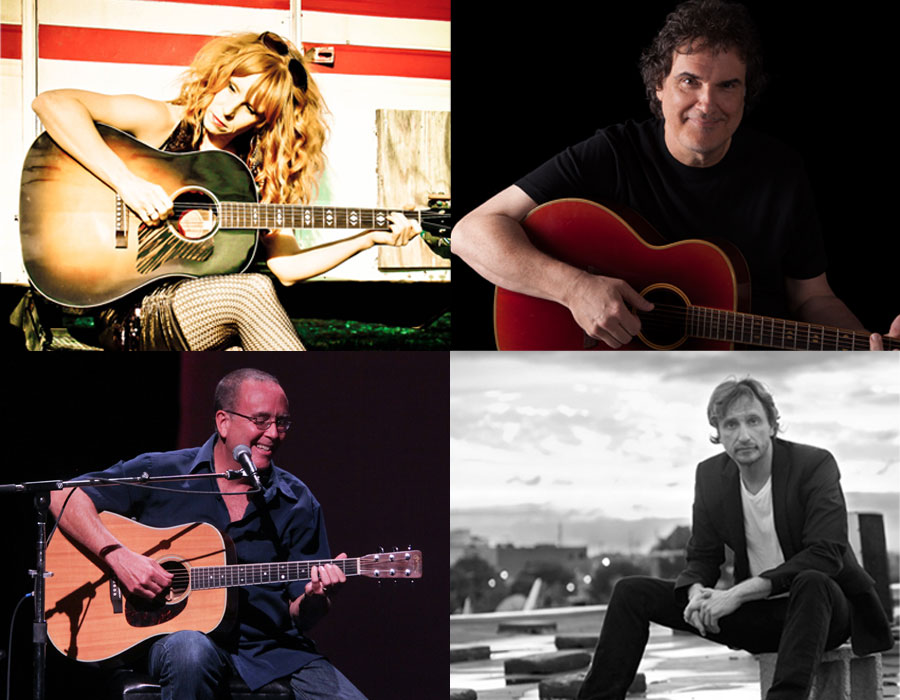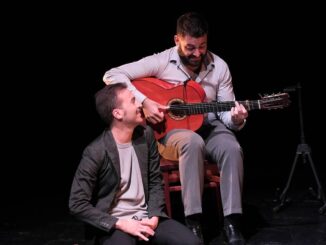
Top Nashville Singer-Songwriters Craig Carothers, Tony Arata, Dave Berg, and Annie Mosher Present a Down-To-Earth Festival Miami Concert, on October 21, Featuring Their Biggest Hits.
They hail from different parts of the USA, and each have their own musical perspective, but singer/songwriters Craig Carothers, Tony Arata, Dave Berg, and Annie Mosher all have something in common. They are some of Nashville’s most successful writers, with a collective catalogue of hit songs made famous by Garth Brooks, Keith Urban, Trisha Yearwood, Rodney Atkins, Reba McEntire, Patty Loveless, Clay Walker, Emerson Drive, Lee Roy Parnell, Carrie Underwood, Kenny Chesney, and more.
Carothers, a lecturer at the Frost School of Music, joins his prolific colleagues “in the round” to present an intimate evening of country music and storytelling at the University of Miami Frost School of Music’s annual Festival Miami on October 21, 8:00 p.m. in UM Gusman Concert Hall. All four will sing some of their biggest hits, offering insight into their songwriting careers, sprinkled with stories and advice about life in the music industry. We caught up with three of the performers for a sneak peek at the secret behind their success.
How does a songwriter develop his/her own voice?
Craig: Learn the 10 songs that you love the most. No two songs by the same artist, or in same style. Learn them as faithfully as you can, exactly as they are played and sung by the artist. Get the sheet music and learn the guitar or piano part. Resist turning them into your style as you learn them. It will take you new places and expand your melodic, harmonic, and lyrical vocabulary.
Tony: Do not write for the radio. One thing that never goes out of style is a classic. If you set about with the knowledge that songs last long beyond their date of creation, and beyond their recording, your aim will at least be true. To this day, I still pull over and listen every time I hear “My Favorite Memory of All,” or “Till I Get It Right” on the radio. Both are examples of how hard ‘simple’ is, as well as how powerful a great melody and a great lyric can be.
Annie: Good writing comes from the heart. Reaching down into your “memory well” for specific details, unique to you alone, keeps it on track. When you ended a special relationship, did you keep his jacket for a month so you could smell it still? When you bought your new truck, how’d it get the first scratch? These little details help when you’re writing from your own place, grounded in your own experience.
Where do you get your inspiration and how do you overcome writer’s block?
Craig: Inspiration is everywhere, and sometimes nowhere. It’s not really something you can summon.”Writer’s block” is being too harsh a critic before you even put anything down on paper. You have to work through it. I always say, contribute more, edit less.
Tony: I don’t believe you have a great deal of control over a good idea. What few decent ideas I’ve had have usually come from just paying attention to the thoughts that find you when you least expect it. “The Dance”(recorded by Garth Brooks) was inspired by a scene in a movie, not by me staring at a sheet of paper hoping to fill up the page.
Annie: Songwriting is work. It’s a job, like any other job. You clock in, you devote your time, you make mistakes, you hit the bulls-eye one out of 20 times. If I wait for the muse to strike, I could be waiting a long time. If I give the muse a daily opportunity to stop in, I’m a lot more likely to get a visit.
What is the greatest benefit AND the greatest obstacle in collaborative writing?
Craig: The other person.
Tony: I have found the greatest success and satisfaction by adhering to the “old school” style of co-writing where one person brings the lyric and the other brings the music. The old school I grew up worshiping includes Mercer/Mancini; Bacharach/David; John/Taupin.
Annie: I’ve learned incredible things from sharing time with other songwriters. I’ve learned guitar riffs, how to expand lyrically, and most importantly, I’ve learned to be brave. Some days it just ain’t there, for whatever reason, and it’s hard to board a fast moving train together. Sometimes it’s just not going to happen, and if it gets going alright, it might not stay on the rails. I learn from that, too.
How do you get your song placed with a big name artist, and are you involved in the recording of it?
Craig: It’s always different. It’s exhilarating, but sometimes frustrating. Your control over a song ends as soon as you get done writing it. You have to let them go. If you feel that the demo of the song represents it well, then really all other decisions are up to the recording artist.
Tony: Most of the stuff I have had success with has been heard first in a live performance, not in a structured meeting in someone’s office. It is the listener that conceives it might work for the artist they represent. Writers, as a rule, don’t have any say in how a song is constructed in the studio. Since most of my demos are just guitar/vocal, it is always a surprise to hear how the producer and the artist have chosen to present it as a final work.
Annie: When Alan Parsons recorded my song “Goldfish” a couple years ago. I went to the studio wondering who he found to sing it, and he said in his spectacularly gentle British accent “Ok, Annie, into the booth you go.” I was shocked. He wanted me to do the vocals. He understood me and my work, and he wanted to capture the song as he heard it. He produced and engineered, and he let me, indie singer and writer of strange songs, go in and sing it for the project. I was deeply touched.
Do you prefer writing a song for someone else or personally performing it?
Craig: I never actually write a song for someone else. Sometimes other people record them, and that’s great, but thinking about it in those terms during the songwriting process has never worked for me.
Tony: I thoroughly enjoy playing, but I never wanted to be a performing artist, if you will, and always dreamed of being a songwriter. There is no greater honor than to have a true artist take a chance on your creation.
Annie: Writing and performing, for me, is the dream come true. I love traveling, I love to plug in and play for folks who came to hear some words and music. I want my kids to see me doing what I believe I was born to do, getting up there and banging it out, feeling vulnerable, unusual, and proud.
To order tickets please visit www.festivalmiami.com or www.music.miami.edu
Maurice Gusman Concert Hall
1314 Miller Dr
Coral Gables, FL 33146
305.284.2438
www.festivalmiami.com
www.music.miami.edu


Be the first to comment